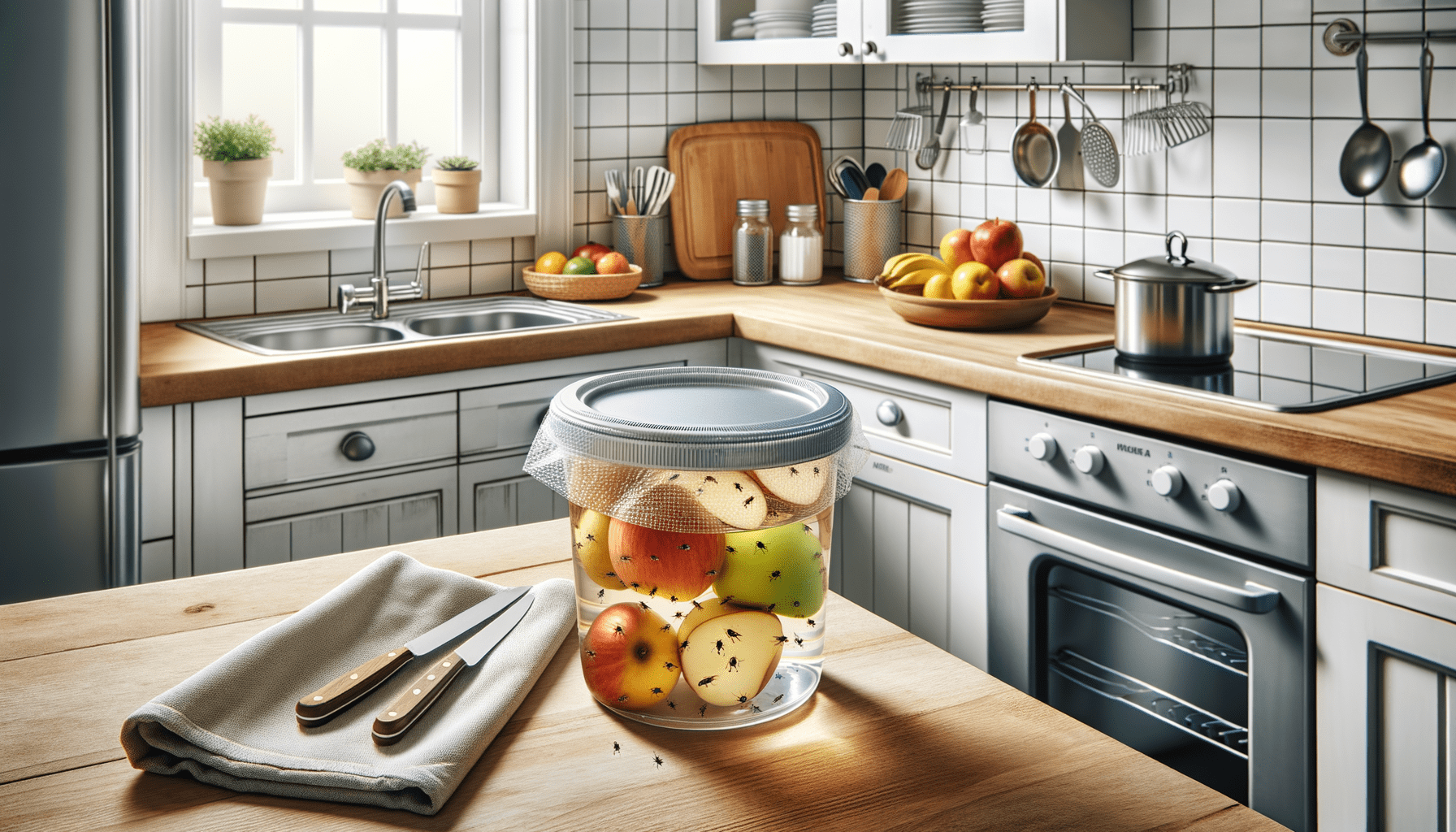Welcome, mate! There’s nothing more frustrating than finding your kitchen swarmed by tiny, pesky fruit flies. But don’t panic; your trusted Dan from Dan’s Plumbing is here to arm you with the knowledge and tips you need to tackle, and more importantly, prevent this annoying situation. Let’s dive into the world of fruit flies in your sinks and drains.
Contents
- Origin of Fruit Flies
- Influx in Kitchen Drains
- Ideas For Drain Clearing
- Eradicating Kitchen Sink Flies
- Three Methods for Removal
- Distinguishing Fruit and Drain Flies
- Attracters of Kitchen Flies
- How to Thoroughly Clean Drains
- Eliminating Persistent Fruit Flies
- Additional Tips for Fly Management
- Final Thoughts
- Frequently Asked Questions (FAQ)
Origin of Fruit Flies
Fruit flies are tiny insects that can lay up to 500 eggs at a time, usually on ripe, rotting, or decayed fruit and other vegetables. The life cycle from egg to adult can be as short as 7 days, making their population surge exponentially in a matter of days. That leads us to why these critters might fancy your kitchen drain.
Influx in Kitchen Drains
You might be wondering, why my kitchen drain? Well, fruit flies are attracted to fermenting fruits and vegetables, sugary substances, and moist areas – including sink drains where organic matter accumulates. As your sink provides everything they need (moisture and decaying organic matter), it becomes their dream home!
Ideas For Drain Clearing

The best approach for dealing with your dilemma lies in a proven method from the experts at Roto-Rooter, pioneers in hydraulic engineering and plumbing solutions. Regularly cleaning your sink drain once a week with a mixture of 1 gallon of water and 1/2 cup of bleach can reduce fruit fly populations by removing their breeding ground. An additional trick is to flush out your P-traps regularly using hot water and vinegar, eliminating any organic debris they could be breeding in.
Eradicating Kitchen Sink Flies
Nothing says clean, like a good old scrubbing. Put on those rubber gloves and clean your drains thoroughly. Pay special attention to the kitchen appliances that may be holding tiny amounts of fermenting food or moisture. Regularly clearing kitchen trash bins, cleaning home appliances immediately after use, and storing ripe fruits in the refrigerator also help significantly.
Three Methods for Removal
Apart from cleaning your sink drain, you can use commercially available fruit fly traps, create DIY vinegar or wine traps, or even use a vacuum cleaner to suck up the pesky invaders. Always remember to dispose of the method used properly and as quickly as possible to avoid reinfestation.
Distinguishing Fruit and Drain Flies

Fruit flies and drain flies are often confused due to their similarities, but distinguishing them is vital for elimination strategies. Fruit flies are typically brownish-orange and attracted to ripened fruit while drain flies are darker, have a moth-like appearance and breed in sewage or dirty drains.
Attracters of Kitchen Flies
What draws these annoying pests? As we know, fruit flies love fermenting fruits and vegetables. They can smell ripening fruit from afar. Other favourites include damp sponges or mops, dirty dishes, garbage disposals, recycling bins and yes, your kitchen sink.
How to Thoroughly Clean Drains
To clean your drains effectively and fruit-fly-proof them try this technique: flood your drain with boiling water followed by an equal mixture of white vinegar and baking soda. Cover with a plug to keep the effervescence working its magic. After 15 minutes rinse it out with more boiling water! You’ll be surprised how sparkling clean your drains get.
Eliminating Persistent Fruit Flies

If you still struggle with persistent fruit flies after doing all the right things, there might be a hidden source of attraction. Investigate any unusual smells in your kitchen. Sometimes an overlooked spill underneath a cabinet or appliance could be all it takes to keep them coming.
Additional Tips for Fly Management
Keep your fruit fresh and out of reach. Regularly check for overripe fruits and remove them immediately. Empty your bins frequently and always clean up spills pronto – particularly sweet or fruity ones! And remember that little critters like these could be a sign of bigger issues such as pipe leakage, so do not hesitate to contact your friendly plumber if necessary.
Final Thoughts
Controlling fruit flies in your kitchen sink involves regular cleaning, proper management and observance of hygiene practices. Remember to inspect, clean, and dry areas vulnerable to infestation. It’s about creating an environment that’s hostile to them. If they’re still giving you grief, consider seeking professional help from your local Dan’s Plumbing!
Frequently Asked Questions (FAQ)
What attracts fruit flies to my kitchen?
Fruit flies love ripe, rotting, or decayed fruit and vegetables. They are also attracted to moist places, such as sink drains, damp sponges or mops, dirty dishes, and garbage disposals.
How can I eliminate fruit flies from my kitchen?
Eliminating fruit flies involves regular cleaning of your sink and drains, thoroughly scrubbing your kitchen appliances and bins, and properly storing ripened fruits. You can also use commercial traps, DIY vinegar or wine traps, or even a vacuum cleaner to remove the flies.
How do I clean my drains to get rid of fruit flies?
Clean your drains effectively by flooding them with boiling water followed by an equal mixture of white vinegar and baking soda. Leave this mixture in for about 15 minutes before rinsing with more boiling water.
What is the life cycle of a fruit fly?
Fruit flies can lay up to 500 eggs at a time, usually on ripe or rotting fruits and vegetables. The life cycle from egg to adult can be as short as 7 days, allowing their population to rapidly increase.
How can I distinguish between fruit and drain flies?
Fruit flies are typically brownish-orange and attracted to ripened fruit, while drain flies, although similar looking, are darker, have a moth-like appearance, and breed in sewage or dirty drains.
What should I do if I can’t eliminate fruit flies from my kitchen?
If you’ve tried all the recommended tips and fruit flies persist in your kitchen, there might be a hidden source of attraction. If this is the case, you should consider seeking professional help from a local plumber to inspect your pipes and potential hidden breeding grounds.
- How Do I Know When It Is Time to Replace a Cracked Porcelain Sink? - November 14, 2024
- What Should I Do If My Water Meter Is Spinning Unexpectedly Fast? - November 14, 2024
- Can a Plumber Help Me Replace a Leaking Garden Tap? - October 14, 2024
Related posts:
 How Do I Prevent Food Scraps From Clogging My Kitchen Drain?
How Do I Prevent Food Scraps From Clogging My Kitchen Drain?
 Can Your Plumbers Help Me Replace a Leaky Kitchen Sink?
Can Your Plumbers Help Me Replace a Leaky Kitchen Sink?
 What Causes Foul Odours in Kitchen Drains?
What Causes Foul Odours in Kitchen Drains?
 Can a Plumber Help Me Replace a Kitchen Sink Sprayer?
Can a Plumber Help Me Replace a Kitchen Sink Sprayer?
 How Do I Prevent Grease Build-Up in My Kitchen Pipes?
How Do I Prevent Grease Build-Up in My Kitchen Pipes?
 What Is The Best Way to Clean Kitchen Plumbing Fixtures?
What Is The Best Way to Clean Kitchen Plumbing Fixtures?



